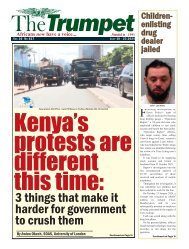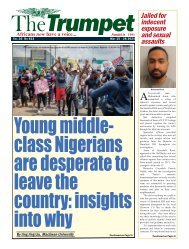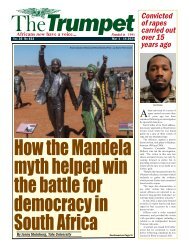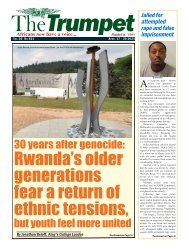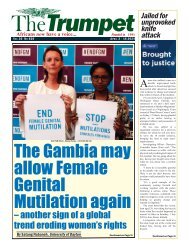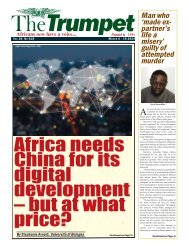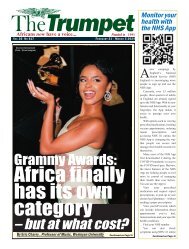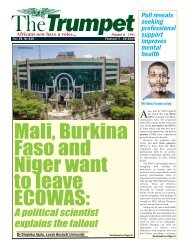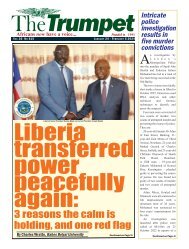The Trumpet Newspaper Issue 624 (May 29 - June 11 2024)
South Africans go to the polls to choose a new government: what's different this time
South Africans go to the polls to choose a new government: what's different this time
You also want an ePaper? Increase the reach of your titles
YUMPU automatically turns print PDFs into web optimized ePapers that Google loves.
Page8 <strong>The</strong><strong>Trumpet</strong> MAY <strong>29</strong> - JUNE <strong>11</strong> <strong>2024</strong><br />
Opinion<br />
Democracy,<br />
governance and<br />
credible elections (1)<br />
BY ABIODUN<br />
KOMOLAFE<br />
<strong>The</strong>re is a problem about the<br />
institutional framework in which<br />
the Nigerian State as presently<br />
constituted is based. To have democracy,<br />
good governance and credible elections,<br />
there must be institutional reforms and<br />
great accountability in government. <strong>The</strong><br />
three are interwoven, only that we tend to<br />
think that democracy is all about<br />
elections. In any case, the fact that those<br />
ingredients are currently missing is an<br />
indication that Nigeria still has a long<br />
way to go. After all, without democracy<br />
and governance, there can’t be credible<br />
elections.<br />
To put it politely, Nigeria, even as we<br />
speak, has very weak institutions, and<br />
without a functional justice system, she<br />
can’t be said to have credible elections.<br />
For any democracy to stand and be as its<br />
definition, the power of credibility cannot<br />
be underestimated. However, the<br />
achievement of this ‘credibility’ is a huge<br />
task, because credibility means different<br />
things to different actors in democracy,<br />
more so as the definition hovers around<br />
the same center: the people.<br />
Notwithstanding, the issues of credibility<br />
in our elections requires a serious<br />
conference, taking into consideration the<br />
level of litigations that always go with<br />
elections in Nigeria. Take, for example,<br />
the United Kingdom where only one<br />
electoral dispute has ever gone to court<br />
over a long period of time. Of course, it is<br />
because she has a functional judiciary and<br />
nobody would want to waste his<br />
resources on frivolous litigations. <strong>The</strong><br />
lawyer who handles such cases can even<br />
be disbarred. So, how come Nigeria<br />
remains a semi-democratic country 25<br />
years into the 4th Republic?<br />
In any serious democracy, it is the<br />
government that sets the right template<br />
for an election to hold. Unlike countries<br />
like Spain, France, South Africa, even<br />
some other African countries, Nigeria<br />
needs a constitutional court so that her<br />
political practitioners can originate and<br />
conclude constitutional issues in record<br />
time. In a constitutional court for<br />
instance, the needless imbroglio currently<br />
troubling the peace of Rivers State won’t<br />
even take more than two to three weeks<br />
to resolve, instead of this long-winded<br />
abracadabra, which is no doubt affecting<br />
the perception of Nigeria as an unserious<br />
economy.<br />
What we are saying is that<br />
governance and elections are intertwined<br />
and that a political economy that is<br />
lacking in internal security mechanisms,<br />
weaponizes and actually glorifies poverty<br />
is not one where credible elections can be<br />
held because it is based on State capture.<br />
In a country under the subordination of<br />
the State to powerful individuals and<br />
vested interests, the idea is to make the<br />
people very poor so that, on an election<br />
day, prospective voters can be induced.<br />
Even when there’s no election, the<br />
masses are induced with palliatives. <strong>The</strong><br />
tragic truth is that political<br />
entrepreneurship has become the<br />
parameter for politicking and the<br />
determinant of victory. Otherwise, why<br />
should minimum wage even be a debate<br />
in Nigeria?<br />
Continued on Page 9




